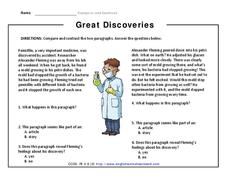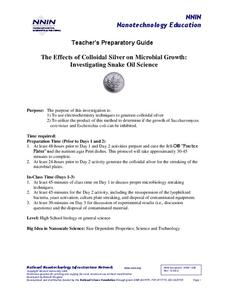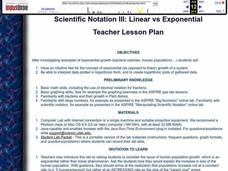Curated OER
Covalent Compounds
In this covalent compounds worksheet, students answer 8 questions about bonding in covalent compounds, covalent bonds, and diatomic molecules. Students draw 2 dot diagrams showing covalent bonding. They answer 4 questions about bacteria...
Curated OER
E.coli and their Human Environment
Students observe how environmental changes (antibiotics) can affect the growth of E.coli, the rod shaped intestinal bacterium. They use the "F" test for statistical analysis. Students
Curated OER
How Clean Is Our Water?
Students examine samples of water to determine its cleanliness. They visit a waste treatment plant and/or reservoir. Students explore what protects the water supply from contamination by chemical or organize pollution. They trace the...
Curated OER
Microworlds in Waterways Around You Home
Students explore the concept that different waterways support different organisms. After completing experiments, students predict what life-forms exist in each waterway in their area. They research how humans impact the habitat of other...
Curated OER
How Can You Prevent Spoilage?
Students complete laboratory activity to discover what temperature is most effective in prohibiting bacterial growth in two percent milk. Students then write lab report detailing findings.
Curated OER
Selecting Soil Organisms in Compost
Students demonstrate that many of the enzyme systems needed to break down--and therefore clean up-society's wastes already exist in nature among the decomposers. They select the best starch-munching organisms by altering the environment...
English Worksheets Land
Great Discoveries
Compare and contrast two paragraphs describing Alexander Fleming's scientific discovery of penicillin using this compare-and-contrast reading worksheet where scholars explain what happens through writing, decide whether the excerpts are...
Balanced Assessment
Multi-Graphs
So many things change as time goes by. Here, scholars create graphs based on this premise. Each problem asks pupils to sketch a graph that describes a given situation. Their graphs represent various characteristics such as height,...
Curated OER
Dinosaur and DNA Days
Biology stars extract DNA samples from beef thymus and then examine its properties. They use enzymes to digest the DNA samples, and then use electrophoresis to separate fragments. Finally, they discuss methods and principles of...
Science Matters
Mighty Microorganisms
How can you tell if a microorganism is helpful or detrimental to an ecosystem? Learners inspect slides or pictures of microorganisms and record their observations to identify those that are beneficial or harmful. They then pretend to...
National Nanotechnology Infrastructure Network
The Effects of Colloidal Silver on Microbial Growth: Investigating Snake Oil Science
Can your classes solve the problem of the smelly sweat sock? Young scientists complete a lab investigation that begins by using electrochemistry to generate colloidal silver. They use their solutions to test the rate of microbial growth...
Curated OER
Impact of a Growing Population
Students examine the impact that population growth has on world resources.
Curated OER
E. coli and Their Human Environment
Students are able to observe how environmental changes (antibiotics) affect the growth of E. coli. They are able to use the "F" test for statistical analysis. Students can explain that E. coli is a common rod-shaped intestinal...
Curated OER
Dissolved Oxygen in an Aquatic Ecosystem
Students explain why dissolved oxygen is important in aquatic ecosystems. They evaluate the optimal dissolved oxygen levels for living organisms.
Curated OER
Scientific Notation III: Linear vs Exponential
Young scholars after investigating examples of exponential growth students have an intuitive feel for the concept of exponential growth of a system.
Curated OER
Mutations--Preexisting or Acquired?
Learners state the controls and variables of the Newcombe spread experiment. They state a hypothesis for the Newcombe spread experiment. Students distinguish between the characteristics of a preexisting mutations and those of an...
Curated OER
Jr. Chef Club
Young scholars review proper hand washing techniques and make a recipe. In this cooking lesson plan, students explore how to wash their hands properly before cooking and how to make a few edible treats.
Curated OER
World of Protists
Students observe a jar of pond water and predict how much life they think exists in the jar and watch a "Bill Nye: The Science Guy" video regarding protists. They participate in an online virtual pond dip where they begin to familiarize...
Curated OER
How Can We Observe Genetic Variation Within a Species?
Young scholars observe intra-species variation by completing standard microbial streaking procedures. They collect data from which they draw observations and complete a worksheet.
Curated OER
Observing the Development of Drosophila in Apple Juice Agar
Students observe the development of the Drosophila fly. They observe the first two stages - the egg and the 3 larval instars. They observe the culture every day for 8 days using a stereo dissecting microscope.
Curated OER
Life's Big Questions: Where Did Life Come From?
Learners explore the life forms that live in the hot springs of Yellowstone. They examine how microscopic creatures can survive in these extreme conditions. Students perform experiments to observe growth samples and demonstrate how a...
Curated OER
Scientific Notation III: Linear vs Exponential
Learners examine the differences in exponential growth and linear growth of a system. They interpret data on graphs and develop their own charts. They answer discussion questions as well.























